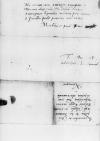Credo infestum aliquem rebus nostris genium in hoc incumbere, ut nobis apud te vel ingratitudinis existimationem paret, vel negligentiae cuiusdam supinae insimulet orig. insumulet⌈insimuletinsimulet orig. insumulet⌉. Usque adeo Nicolaus Everardi (Nicolaas Everaerts) (*ca. 1461 – †1532), father of the neo-Latin poets Ioannes Secundus, Nicolaus Grudius and Hadrianus Marius; 1509-1528 president of the council of Holland, since 1528 president of the grand council of Mechelen (CE, vol. 2, p. 446-448)⌊patrem nostrumNicolaus Everardi (Nicolaas Everaerts) (*ca. 1461 – †1532), father of the neo-Latin poets Ioannes Secundus, Nicolaus Grudius and Hadrianus Marius; 1509-1528 president of the council of Holland, since 1528 president of the grand council of Mechelen (CE, vol. 2, p. 446-448)⌋ importunus morbus assidue domui, quid domui, immo lecto alligare persistit non sine gravi nostro dolore ac dubito paterna ne sorte cruciemur magis, an illo, quod hoc infortunio negotium nobis abs te commissum aeque commode promovere prohibemur. Nicolaus Everardi (Nicolaas Everaerts) (*ca. 1461 – †1532), father of the neo-Latin poets Ioannes Secundus, Nicolaus Grudius and Hadrianus Marius; 1509-1528 president of the council of Holland, since 1528 president of the grand council of Mechelen (CE, vol. 2, p. 446-448)⌊PaterNicolaus Everardi (Nicolaas Everaerts) (*ca. 1461 – †1532), father of the neo-Latin poets Ioannes Secundus, Nicolaus Grudius and Hadrianus Marius; 1509-1528 president of the council of Holland, since 1528 president of the grand council of Mechelen (CE, vol. 2, p. 446-448)⌋, qui valetudine integra rem in manu fuerat habiturus, apud senatum iam partes precantis agat, oportet, certe sic imperare non potest, quin illi, si quas forte causas sibi commendatiores habent, praetextu aliquo invento praeferre possint superinscribed⌈possintpossint superinscribed⌉. Tametsi pollicitus est ille, qui proximas a Nicolaus Everardi (Nicolaas Everaerts) (*ca. 1461 – †1532), father of the neo-Latin poets Ioannes Secundus, Nicolaus Grudius and Hadrianus Marius; 1509-1528 president of the council of Holland, since 1528 president of the grand council of Mechelen (CE, vol. 2, p. 446-448)⌊patreNicolaus Everardi (Nicolaas Everaerts) (*ca. 1461 – †1532), father of the neo-Latin poets Ioannes Secundus, Nicolaus Grudius and Hadrianus Marius; 1509-1528 president of the council of Holland, since 1528 president of the grand council of Mechelen (CE, vol. 2, p. 446-448)⌋ vices in senatu gerit, et affirmavit mihi, affirmavit et fratri, qui etiam hodie illum patris nomine hac de re interpellavit, curaturum sese, ut res hae prae reliquis terminentur.
Meam ego Nicolaus Grudius (*1503/1504 – †1570/1571), neo-Latin poet, one of the Tres Fratres Belgae; 1532 imperial secretary (he replaced Alfonso de Valdés), 1535 councillor in the council of Holland in The Hague, 1538-1548 secretary to the Privy Council and the Council of State of the habsbur Netherlands, in 1533, as receiver-general of Brabant, suspected of embezzlement and arrested by order of Mary of Hungary. In 1555 he went abroad and died in Venice (DeV, s. 122; CE, vol. 2, p. 139-140)
Hadrianus Marius (Adriaan Nicolai) (*1509 – †1568), a neo-Latin poet, son of Nicolaas Everaerts, who was president of the council of Holland and then of the grand council of Mechelen (GUÉPIN)⌊fratrumNicolaus Grudius (*1503/1504 – †1570/1571), neo-Latin poet, one of the Tres Fratres Belgae; 1532 imperial secretary (he replaced Alfonso de Valdés), 1535 councillor in the council of Holland in The Hague, 1538-1548 secretary to the Privy Council and the Council of State of the habsbur Netherlands, in 1533, as receiver-general of Brabant, suspected of embezzlement and arrested by order of Mary of Hungary. In 1555 he went abroad and died in Venice (DeV, s. 122; CE, vol. 2, p. 139-140)
Hadrianus Marius (Adriaan Nicolai) (*1509 – †1568), a neo-Latin poet, son of Nicolaas Everaerts, who was president of the council of Holland and then of the grand council of Mechelen (GUÉPIN)⌋que diligentiam profiteri possum, de Nicolaus Everardi (Nicolaas Everaerts) (*ca. 1461 – †1532), father of the neo-Latin poets Ioannes Secundus, Nicolaus Grudius and Hadrianus Marius; 1509-1528 president of the council of Holland, since 1528 president of the grand council of Mechelen (CE, vol. 2, p. 446-448)⌊patrisNicolaus Everardi (Nicolaas Everaerts) (*ca. 1461 – †1532), father of the neo-Latin poets Ioannes Secundus, Nicolaus Grudius and Hadrianus Marius; 1509-1528 president of the council of Holland, since 1528 president of the grand council of Mechelen (CE, vol. 2, p. 446-448)⌋ affectu nihil ambigo. Reliquorum officium sperare licet, polliceri non ausim. Non dubito tamen, quin brevi admodum finis expectandus sit. Sed hoc pessime me habet, quod tu, qui hac causa istic moratus esse potes, re fortassis infecta discedens sinistrae aliquid de nobis opinionis tecum forsan abduces. Quod quidem magis mihi metuendum putarem, nisi candorem illum tuum singularem nimis perspectum nobis esse voluisses. Nos hoc una cum m(agistro) probably Giles de Busleyden (Aegidius) ⌊Aegidioprobably Giles de Busleyden (Aegidius) ⌋, qui oscitantes quoque nos sua diligentia ad officium nostrum propellere posset, agemus sedulo, ne negotio defuisse aliquo modo videri possimus.
Bene vale feliciterque migra, Praesul optime, et ut poetice quoque Vergilii Dani more valedicam.
I, fausto pede patrias ad urbes
Phoebeae pie cultor artis ito,
Nec picus vetet ire te molestus
Nec cornix iter ominosa rumpat.
Faunus dux erit et celer Deorum
Interpres liquidas volans per auras.
I, fausto pede patrias ad urbes.


 AAWO, AB, D. 6, f. 140v
AAWO, AB, D. 6, f. 140v